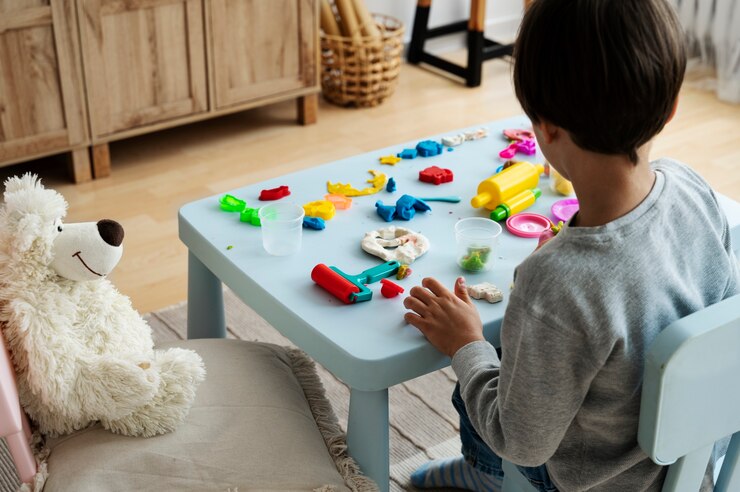
Blog
5 Types of Plays for Kid’s Development

Play is an essential and fun part of childhood and also important for children’s physical, social-emotional, and intellectual development. Parents don’t have to tell their children how to play, It’s natural. Play can naturally take many forms of play all at once or jump from one type of play to another.

Each type of play can offer benefits to children that can help children have fun and learn in various ways. Whether they’re building muscle through any physical play or kind of expressing themselves through creative play. Kids can grow and thrive from these fun activities. Let’s look at 5 types of play for child development.
-
Structured Play
Structure play is also known as guided play, which includes organized activities with some specific purpose and set of parameters. Often these kinds of activities are directed or at least supervised by adults. Some examples of structured play include two children playing a game of checkers, a group of kids playing a game of soccer, or students taking part in an educational game at school.
-
Independent Play
Engaging kids in solo play, makes them learn about their surroundings, also build confidence and independence, and practice creativity. Young kids can be entertained by different things such as playing with objects, such as toys, stuffed animals, or any musical instruments and more. Give your child freedom to do whatever they wish to, and always remember that creativity is important for development.
From birth to around 2 years old, children don’t pay much attention to playmates in social settings. They’d rather keep themselves entertained through independent play. By engaging in solo play, kids learn about their surroundings, build confidence and independence, practice creativity,
3. Constructive Play
This kind of play educates children on how to set things together, build with blocks and tools, and manipulate objects. This helps children to develop their fine motor abilities and their intelligent knowledge of objects. Open-ended toys are shining for this type of play, as they encourage toddlers to exercise their creativity and survey various habits to play with them. Wooden blocks, flexible bricks, and easy parts like frozen dessert sticks are usual toys that are suitable for helpful play. Kindergartens in Singapore often stock these sorts of toys, knowing just how valuable they are for knowledge.
4. Cooperative Play
Once children start performing interactively, they are charming in helpful play. They incorporate their new public abilities and should consent to each one to play favorably. They discover how to bargain, compromise, and resolve questions – despite they may resolve them in habits that a person’s ability almost approves of. Tears and tantrums are likely to result, but they are also a sign that your children are figuring out how relationships and friendships work. Cooperative play is the key to future interactions, as kids evolve and mature.

5. Dramatic play
During dramatic play, kids start to exercise their imagination. They make up stories accompanying each one and this helps to develop their language abilities and creativity. Role-playing further helps them to build the rules of their invented planet and how the better society works and functions. Give your youth old attire that they can use as costumes – scarves, hats, traditional T-shirts and aprons are ideal. Kindergartens and playgroups may frequently have more elaborate styles (anticipate Spiderman masks and Elsa gowns), but obsolete clothes are absolutely useful and stretch children’s imaginations.
Teach your children the emotional tools to handle inevitable disappointments and expected kind, either as a first or loser. It is mainly that they understand that the greatest goal is to experience themselves and something. Many local preschools may ignore awards, for this reason, to guarantee that the kids from something with performing rather than outright competing for a prize.
